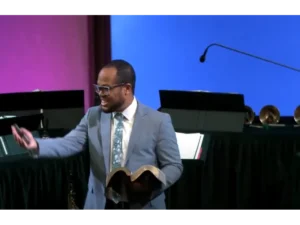Happy Monday! On Sabbath, we continued our series on Jonah and saw the God of second chances. We left Jonah last week being interrogated these questions: “Tell us, who is responsible for making all this trouble for us? What kind of work do you do? Where do you come from? What is your country? From what people are you?” (1:8)
Rewind to Jonah 1:9 for his answer. “I am a Hebrew and I worship the Lord, the God of heaven, who made the sea and the land.” How hard this must have been for Jonah! It’s embarrassing enough to have been sleeping while everyone else was praying, but now he admits that He serves the God who controls the very seas that threaten to swallow them. Not only that, his words are an admission to himself and everyone on board of his foolishness for thinking he could run from God.
Psalm 139:1-6 makes it clear. “O Lord, you have examined my heart and know everything about me. You know when I sit down or stand up. You know my thoughts even when I’m far away. You see me when I travel and when I rest at home. You know everything I do. You know what I am going to say even before I say it, Lord. You go before me and follow me. You place your hand of blessing on my head. Such knowledge is too wonderful for me, too great for me to understand!”
And this is the God we serve! How awesome to know and serve a God like this. And how awful to know and serve a God like this–but live like you don’t!
Compare Jonah’s response in a storm with the apostle Paul’s in Acts 27:13-26. In contrast to Jonah who was running away from his mission, Paul was fearless because he was on God’s mission and knew nothing was going to happen to him until that mission was accomplished.
Do you know you have a mission? Do you know what it is? If not, pray to the God who knows everything about you. Ask Him to reveal your mission, and then get after it. When you pursue the mission God gave you, your obedience actually gives hope to others. (See Acts 27:23-25.)
That’s how Christians who know and walk with the risen Lord of all creation are to act in a stormy world. Hope givers are God chasers and God obey-ers, not God flee-ers. I want to be a person of hope today, don’t you?
To obey God meant death to Jonah’s worldview. To run from God was a death to his calling and relationship with God. And now Jonah faces literal death as a consequence of his disobedience. No matter which way Jonah turned, some kind of death was inevitable. And the same is true for those who follow Christ–death to self is inevitable and must occur before life. (See Mark 8:34, 35.)
To follow Christ is to imitate the One who died to sin and rose again. Christianity is not about going to church or following a set of rules. It’s about resurrection!
When faced with death to his ideas and attitudes, Jonah rather drown than switch. Some who are reading this are right there with Jonah. Your life choices are killing you and everything you touch, but you prefer to die in your sin than to die to your sin.
In verse 13 Jonah makes the sailors accomplices in his suicide. But the soldiers have more compassion for Jonah than he does for them. The pagans worked harder for the salvation of the Christian than the Christian for the pagans. Again, who is more deserving of God’s mercy in this story? And in verse 14 they prayed to God even though Jonah hadn’t!
The God of second chances is able to use even our mistakes to help others come to know him. These sailors became Jonah’s first converts. It may be painful but admitting our sins can be a powerful example to those who don’t know God. Yet there is still one in the story who is in need of God’s mercy.
Jonah goes into the sea, “But the Lord provided a great fish to swallow Jonah,…” (vs. 17) Isn’t it ironic that everything in this story obeys God but Jonah! The storm obeys, the sailors obey, the fish obeys, the Ninevites obey, the vine obeys, the worm obeys, the wind obeys. Everything and everyone in the narrative responds to the call of God except God’s prophet. But Yahweh is the God of second chances, and He never gives up on us.
“From inside the fish Jonah prayed to the Lord his God” (2:1). Finally, Jonah prays! And from the strangest prayer closet ever. But Jonah’s prayer was heard from inside the fish—about as far as you can be—in the depth of the sea.
Rewind to verses 2-9 and here we learn important lessons about prayer in the midst of failure:
- Anytime and anywhere is the right time and the right place to pray.
- God meets us even in our self-imposed trouble. (Consider Adam, Jacob, Elijah)
- You can thank the Lord for confronting us with our disobedience. Jonah’s prayer is one of thanksgiving. It is crucial to thank God for loving us enough to do whatever is necessary to make us face our sin.
To save us, God will allow us to go through a time of death to our willfulness. As we become aware of the hopelessness of changing either ourselves or the problem we created, we give up. We hit rock bottom. We cast ourselves into the arms of Mercy and that is when resurrection to a new beginning can happen.
Jonah comes to himself in the belly of the fish and says at last, “Salvation comes from the Lord.” (Vs. 9) Salvation comes from the God of second chances. Think about it. Why did God send a fish at all? What did Jonah deserve? Death. It is what he fully expected. But God doesn’t want to smite; He wants to save. His prophet, like His people, were in rebellion against Him, but God wants to bring all men—sinful sinners and sinful saints—to repentance. Jonah couldn’t get out until he gave up. God did not heal Jonah’s spiritual sickness before the prophet realized just how sick he was.
And when he did, “the Lord commanded the fish, and it vomited Jonah onto dry land.” The prophet received the mercy that he was unwilling to preach about in Nineveh. He experienced a second birth and a second chance. Do you need a new start? Feeling like you have reached rock bottom? Don’t quit. Salvation comes from the Lord. You won’t be able to get out of your despair until you give up. There’s mercy for you today. Won’t you take it? —Pastor Randy
p.s. Our teaching series will continue after camp meeting, on June 29. Join us on the campus of Auburn Adventist Academy June 15-22. The church will be open during the two Sabbaths of camp meeting for small group Bible study.





